National CAPACD’s Policy Achievements in 2023
In 2023, National CAPACD released our 2023-2024 Policy Action Agenda, a policy strategy and advocacy plan to advance our federal policy priorities during the current legislative cycle. To learn more about the agenda, watch the recording of the webinar hosted by our Policy team here.
In support of our 2021-2024 Policy Platform, this year National CAPACD:
- Participated with members in the Treasury Department’s Community Development Financial Institutions (CDFI) Other Targeted Population (OTP) focus groups.
- Sent member-signed comment letters for federal rulemaking regarding: Affirmatively Furthering Fair Housing (AFFH), Office of Management and Budget (OMB) race and ethnicity data standards, Consumer Financial Protection Bureau (CFPB) Federal Trade Commission tenant screening protections, Federal Housing Finance Agency (FHFA) multifamily tenant protections, and FHFA equitable financing plans.
- Endorsed 7 Congressional bills and signed on to 51 support letters.
We also continued to work with our national partners in the following ways:
- Joined the Community Builders of Color Coalition to ensure that disadvantaged communities benefit from the Greenhouse Gas Reduction Fund (GHGRF), created by the Inflation Reduction Act.
- Began planning for People & Places 2024 with NALCAB and the National Alliance of Community Economic Development Associations (NACEDA).
- Defended the funding mechanism and independence of the CFPB in danger of being cut by Congress with members and the Asset Building Policy Network (ABPN). We advocated for the CFPB by sending a sign-on letter to Congress and a card of support to the CFPB on its birthday, and hosting a webinar for community leaders explaining the importance of the Bureau and how to advocate.
As part of the Entrepreneurs of Color partnership, we joined the National Association for Latino Community Asset Builders (NALCAB), and the Center for Responsible Lending (CRL) to engage policymakers on the unique challenges faced by entrepreneurs of color in accessing opportunity, funding, and support at the federal level. To show the real impact that federal policy changes would have on minority-owned small businesses, we collected the stories of entrepreneurs of color, which you can read here.
 2023 Community in the Capital Fellows during their Oakland retreat in July
2023 Community in the Capital Fellows during their Oakland retreat in July
We continued to support and engage with our members throughout the year by meeting with them one-on-one to understand their work and policy needs, as well as meeting regularly with members who are part of National CAPACD’s Policy Committee. Our 2023 Community in the Capital Fellowship also provided seven fellows with the opportunity to spend five months learning about Asian American, Native Hawaiian, and Pacific Islander (AA and NHPI)-specific public policy advocacy, how the federal government impacts their work at the local and state government levels, and how to identify needs in their communities and translate them into policy solutions.
Webinar Recording: Trauma and Healing in AA and NHPI Community Organizations
AA and NHPI communities have long been affected by the traumas of violence, poverty, land theft, war, and racism. Recently, the COVID-19 pandemic and the economic crash have created new waves of mental health challenges in our communities. In May, National CAPACD marked both Asian Pacific American Heritage Month and Mental Health Awareness Month by hosting a webinar on how AA and NHPI community development organizations can be more trauma-informed. We were joined by speakers from Ka ʻAha Lāhui O ʻOlekona Hawaiian Civic Club (KALO HCC) of Oregon and SW Washington Raksha, Inc., and United Cambodian Community.
Overcoming Financial Barriers: CDFIs and Credit for AA and NHPI Entrepreneurs
AA and NHPI entrepreneurs often encounter unique obstacles when attempting to access mainstream financial products and services. In May, National CAPACD co-hosted a LinkedIn Live event with Prosperity Now, which featured two of our members, Asian Services in Action (ASIA) and Hmong American Partnership (HAP), on how Community Development Financial Institutions (CDFIs) and credit can help overcome these challenges and provide alternative sources of financing for the entrepreneurs in our communities.
#OurNeighborhoods Peer Learning Program Participants Meet in Washington, D.C.
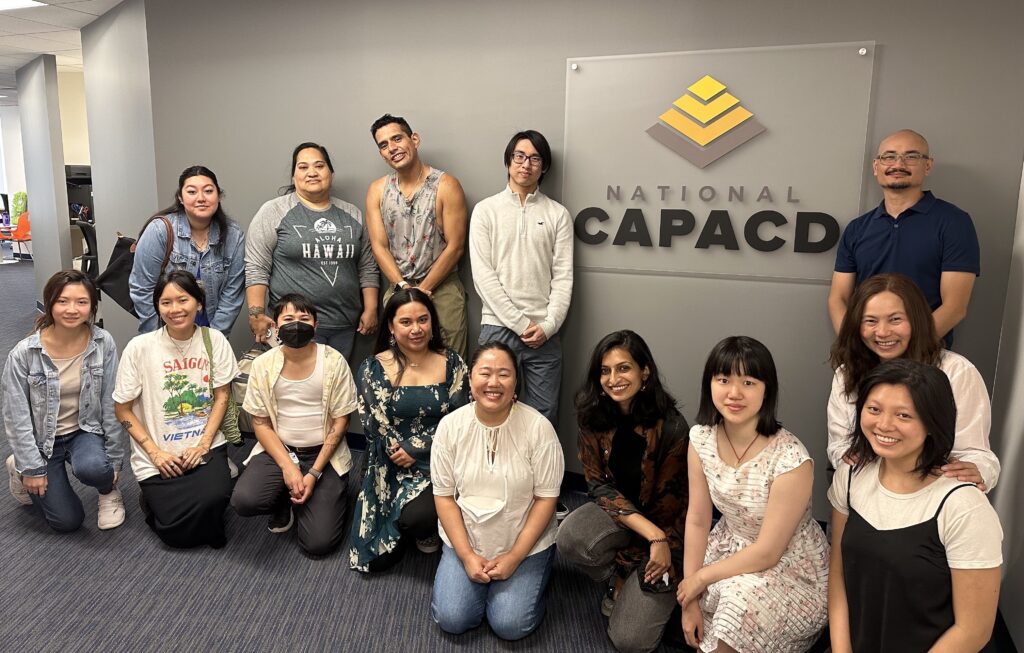
In May, National CAPACD held the first in-person convening of the #OurNeighborhoods Peer Learning Program at our office in Washington, D.C. Organizers and advocates from seven different states met in person for the first time after four months of virtual peer learning sessions. Participants deepened their connections by sharing when they first encountered community organizing and their hopes and vision for the anti-displacement work in AA and NHPI communities. Thank you to TD Charitable Foundation for its generosity and support of the #OurNeighborhoods Peer Learning Program.
Small Business Program Participants Convene in Portland, OR
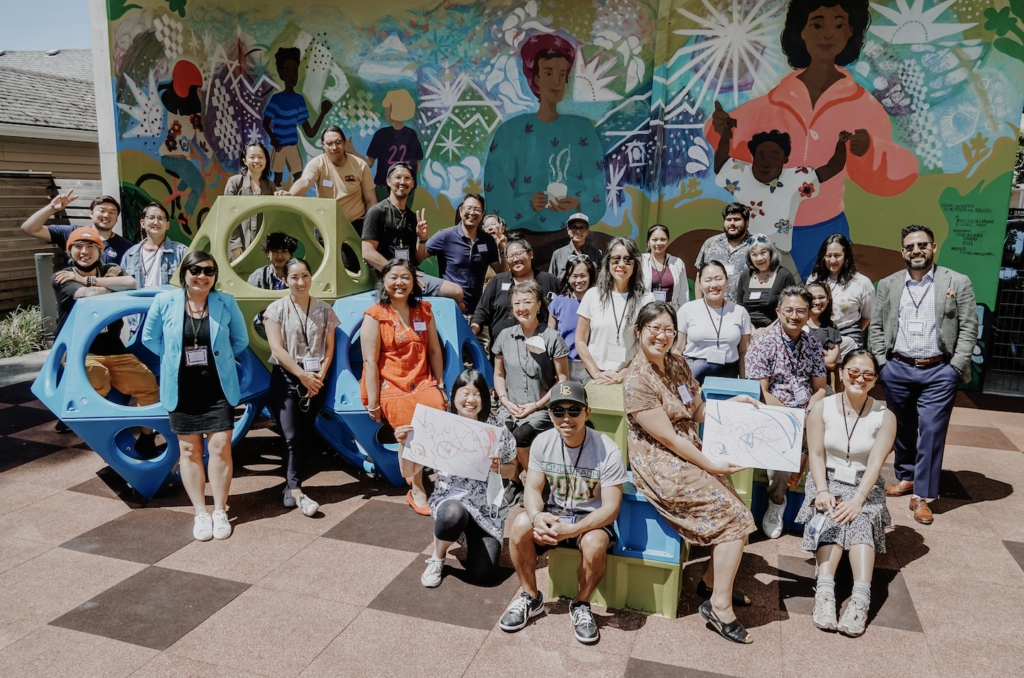
In June, National CAPACD’s Small Business Program participants met in Portland, OR, for our Small Business District Stabilization Convening. This two-day convening allowed 20 participants representing 13 organizations to learn and engage in conversations around small business recovery efforts, local policy advocacy, community safety, and multicultural coalition building. Thank you to APANO for generously hosting the convening at their Art + Justice Lab / Event Space, and to Toyota for sponsoring the convening. We’d also like to thank Kaiser Permanente for supporting National CAPACD’s Small Business Program.
New Data Released on AA and NHPI Communities Experiencing Poverty
To ensure we have data that reflects the lived experiences of our communities and challenges pervasive harmful narratives, National CAPACD worked with Emiko Kranz at the UCLA Asian American Studies Center to update the data we have available on AA and NHPI communities experiencing poverty in the United States, based on the Census 2021 American Community Survey (ACS) data. We hope that this data underscores the importance of data disaggregation – it is only when we disaggregate data that we can accurately capture the diverse experiences of AA and NHPI communities. Access the new poverty data here.
Building Power, Fighting Displacement: Stories from Asian Pacific America
National CAPACD and Nonprofit Quarterly (NPQ) co-produced a series of articles, in partnership with some of our coalition members, that highlighted stories of comprehensive community development in Asian American and Pacific Islander communities across the United States. Comprehensive community development is a place-based approach that deploys a diverse set of holistic strategies that center a community’s culture and assets and their vision for their places. Read the articles here.
Thank you to Chinatown Community Development Center (CCDC), Asian American Resource Workshop (AARW), United Cambodian Community (UCC), and White Center Community Development Association (WCCDA) for sharing their experiences and the stories of their communities!
National CAPACD’s 2023 Impact Report
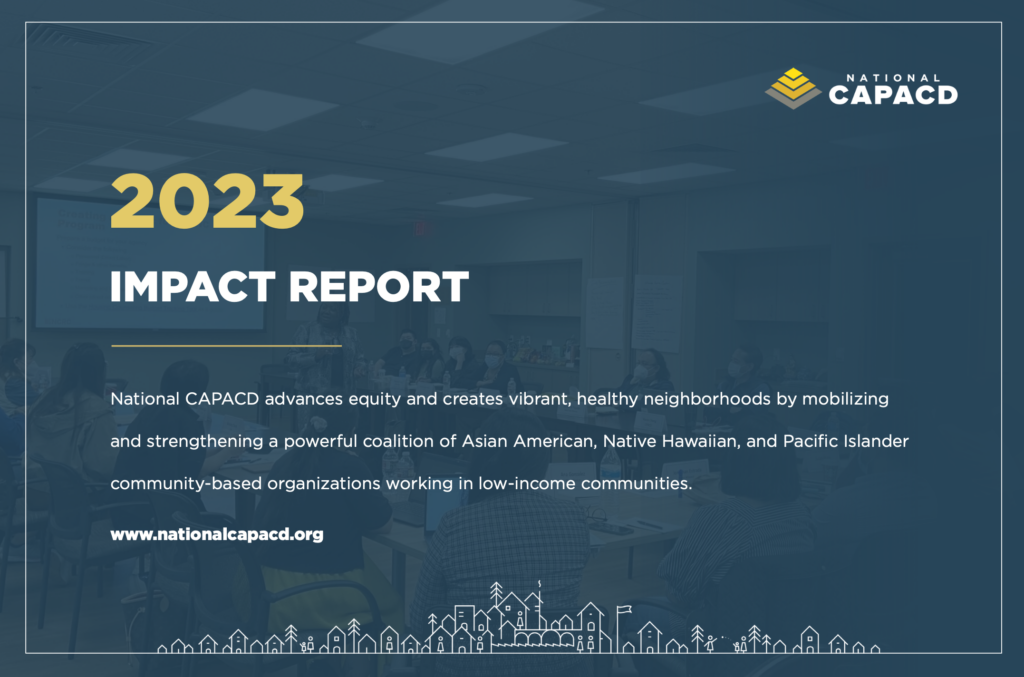
National CAPACD’s 2023 Impact Report showcases our programmatic impact in low- and moderate-income AA and NHPI communities through data over the course of a year. Thank you to all for joining us in mobilizing and strengthening a powerful coalition of AA and NHPI community-based organizations. We invite you to read our 2023 Impact Report here and learn more about our coalition’s collective impact last year.
National CAPACD’s Housing Counseling Network Convenes in Chicago
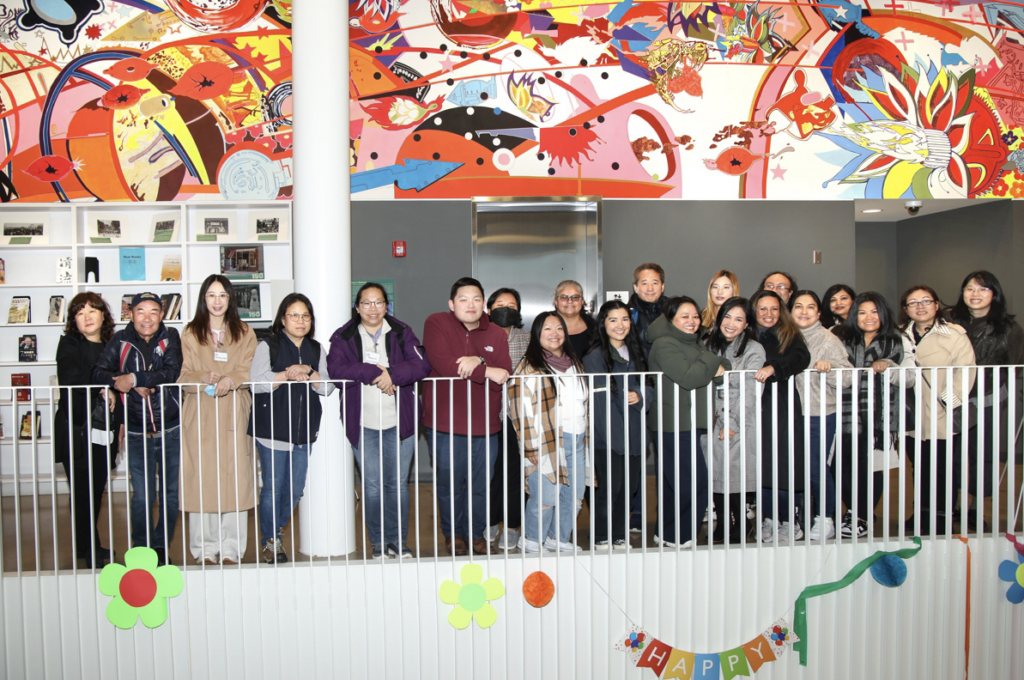 Photo credit: Dot Ward, Inc
Photo credit: Dot Ward, Inc
In November, National CAPACD’s annual Housing Counseling Convening was held in Chicago. Members of National CAPACD’s Housing Counseling Network engaged in peer learning activities, a cultural tour of Chicago’s Chinatown, and a comprehensive disaster preparedness training facilitated by the National Community Reinvestment Coalition (NCRC). This convening allowed participants to share their challenges and successes, learn from each other, and learn how to serve our communities better. Special thanks to our host in Chicago, Chinese American Service League (CASL), a HUD housing counseling agency within National CAPACD’s Housing Counseling Network.
To Lift All Boats: A Storytelling Evaluation of the Community Resilience Fund, 2022-23
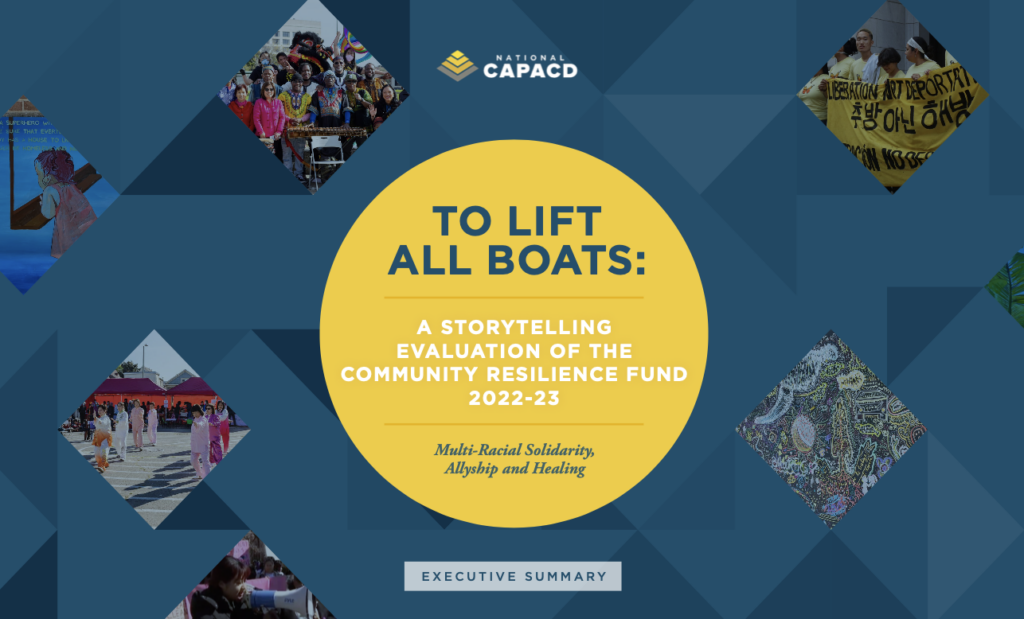
Through the 2022-23 AA and NHPI Community Resilience Fund, National CAPACD supported 21 local community-based organizations with flexible funding and other resources to support cross-racial allyship, solidarity, and healing work in AA and NHPI communities across the US. It is our privilege to share the lessons learned from the work accomplished by recipients of this fund in a new evaluation, To Lift All Boats: A Storytelling Evaluation of the Community Resilience Fund, 2022-23. We invite you to enjoy these stories that will leave you feeling inspired and hopeful. Read the reports here.
